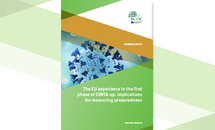Laboratory support for SARS-CoV-2 virus neutralisation in the EU/EEA - a pilot study
This report presents the results of a pilot study aimed at assisting EU/EEA countries with SARS-CoV-2 antigenic characterisation.
Executive Summary
An ECDC pilot study was launched aiming to assist EU/EEA countries with SARS-CoV-2 antigenic characterisation by providing central laboratory testing with advanced methods to six contributing countries. The study was active between March and December 2021. A total of 120 specimens (isolates and nasopharyngeal swabs) were received, 70 of which were successfully sequenced. For the remaining specimens, the sequencing attempts were unsuccessful either due to culturing issues, insufficient material, or technical issues during sequencing. Virus neutralisation assay was successfully performed for 21 specimens selected from different SARS-CoV-2 clades (at least one representative sample of all the clades collected from the participants) and showed varying levels of virus neutralisation among variants. The serum panel contained samples collected during two of the pandemic waves in the Netherlands (when wildtype and Alpha variant respectively were predominantly circulating) and from vaccinated individuals with three different vaccines (Comirnaty, Spikevax and Vaxzervia). The pilot study demonstrated the need for individual optimisation of the assays for each SARS-CoV-2 variant, something that was not previously expected. Moreover, the study also highlighted the added value of having EU/EEA centralised advanced laboratory support for virus characterisation, using standardised methods on specimens deriving from different locations, timepoints and populations.





